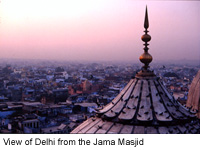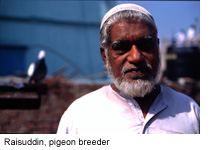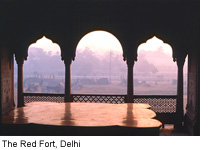City
of Djinns - Programme 2
Monday, April 10th, 7.10
Delhi, Indian's capital, is a city of great beauty, but
with some disturbingly nationalistic currents now running through it.
For centuries the opposing religious factions of Hindus and Muslims have
rubbed uneasily, sometimes violently, alongside each other.
 |
In this
second programme of the series William Dalrymple looks at Delhi's history
and examines how its turbulent past has heavily influenced the life of
the city today.
He peels back many of the mysteries surrounding the ancient tradition
of sufism, whose greatest leader - Shaykh Nizam-ud-Din - is buried in
the city, and reaches the conclusion that Sufism is a form of religion
that brings together the best parts of both the colourful Hindu religion
and the more austere beliefs of Islam.
 |
He examines,
too, the legend of the Djinns - invisible spirits fashioned from fire
that live in Delhi and under whose influence, its inhabitants believe,
Delhi has continued to be reincarnated throughout its history, despite
its troubled past.
Says William: "Century after century of invaders have swept onto the rich
plains of India from central Asia, and time and again, they have burned
the city of Delhi only to rebuild their capitals on the same site.
"This is not one city but many. They say there are seven old cities of
Delhi. As each city came to be abandoned to the surrounding jungle another
was simply rebuilt nearby on a different location."
 |
William
who lived in Delhi for five years, visits the site of the first city of
Delhi. All that remains of it today are the crumbling walls of the Raja's
Palace. It was on this site in the 12th Century that Muslims invaded from
Afghanistan, defeated the Hindu ruler's army and beheaded him.
William talks to B.L. "Prem" Sharma, who was (at the time of filming)
the central secretary of the VHP, a right-wing pressure group influential
with the BJP. He claims that the invasion was the start of 700 years of
oppression and conflict by the Muslims in India.
"Prem" Sharma's extreme position illustrates the religious zeal which
exists in Delhi today and which, says William, threatens to bring the
city to ruin once again.
"Living side-by-side with 800 million Hindus are 100 million Muslims.
The prospect of extremely violent conflict between them hardly bears thinking
about."
But in the Muslim district of Nizamuddin, in a sufi enclave not far from
the edge of Imperial Delhi, William finds a remarkable degree of religious
tolerance between both Muslims and Hindus - devotees of sufism.
 |
"Sufism
has always been deeply imbued with the ideals of tolerance and acceptance
and so found a natural home in India which has always been known for precisely
those qualities," says William.
"The Sufi ethic still provides a glimmer of light in what feels to be
a fast darkening sky."
Links Sufism:
www.ias.org/sufism.html
www.naqshbandi.net/haqqani/Sufi/sufi_islam.html www.geocities.com/Paris/LeftBank/4797/qawwali2.txt
Nusrat Fateh Ali Khan: (Realworld Music) http://realworld.caroline.com/nusrat/nusrat.html
The Hindu Newspaper: www.the-hindu.com